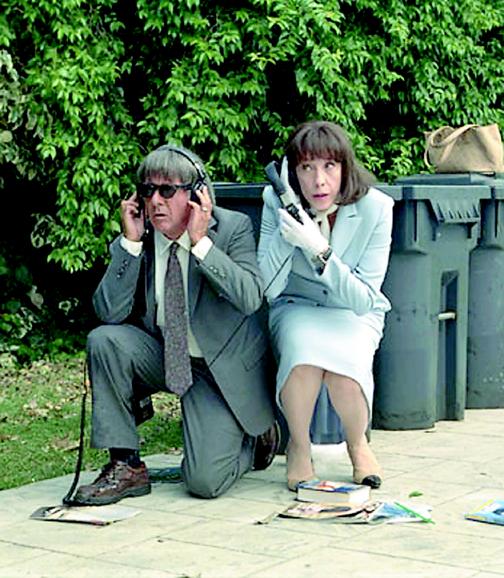Existentialism is something of a tricky subject, especially for a wacky comedy. For this odd outing, Russell diverges from satire, a genre he has helped redefine (along with such directors as Election's Alexander Payne and Happiness' Todd Solondz). Instead, he takes on a disdainful approach to dime-store philosophy. In fact, not since Eustache's great The Mother and the Whore, or Linklater's Waking Life, have I been so acutely aware of a filmmaker's inclination to embrace all sides of an argument, regardless of his stance. I Heart Huckabees is an attempt at sermonizing that is too sincere to cause umbrage, and too muddled to be taken as anything but white noise.
The film's “hero” is Albert Markovsky (Jason Schwartzman, Rushmore), a surly malcontent who is angry because he hasn't figured out the meaning of life. He employs two “existential detectives” (Dustin Hoffman and Lily Tomlin) to examine every aspect of his life and, hopefully, aid him in his discovery. Albert is the head of a group that tries to preserve green open spaces under the weight of suburban sprawl. He strikes a devil's bargain with his would-be archenemy Brad (Jude Law, in the film's best performance), a smug executive at the superstore chain Huckabees, in which they will exist in alleged harmony while working on an environmental project. Rounding out our enlightenment-challenged cast are Mark Wahlberg as a firefighter obsessed with the negative effects of petroleum, Naomi Watts as a model who learns to reject Huckabee's notion of beauty and Isabelle Huppert as a misanthropic philosophe bent on destroying our existential detectives' concept of universal harmony.
I Heart Huckabees, despite its reasonable intentions, remains unsuccessful in its quest for significance. This is delicate material, and Russell–who made a name for himself with works of such crisp, biting efficiency as Spanking the Monkey, Flirting with Disaster and Three Kings–wastes no time in creating a landscape in which the wholesale abandonment of logic is irrefutable. The film is at once childishly inquisitive and rotten with camouflaged cynicism; its supposed faith in humanity is laced with merciless acrimony. In the end, the film provides its audience with lots to chew on but nothing to digest.
No one could accuse Russell of being disingenuous; his film succeeds estimably in its aim to entertain and intrigue the audience. There are moments when Schwartzman's bewildered mugging or Tomlin's straight-faced earnestness raise a chuckle or two. But, ultimately, Huckabees amounts to nothing more than two hours of cinematic self-indulgence. I Heart Huckabees is egotistical, tiresome and, if seen as an exercise in self-inquisition, obnoxiously feeble. Is this the final death rattle for philosophical cinema, or simply for Dustin Hoffman's career?



